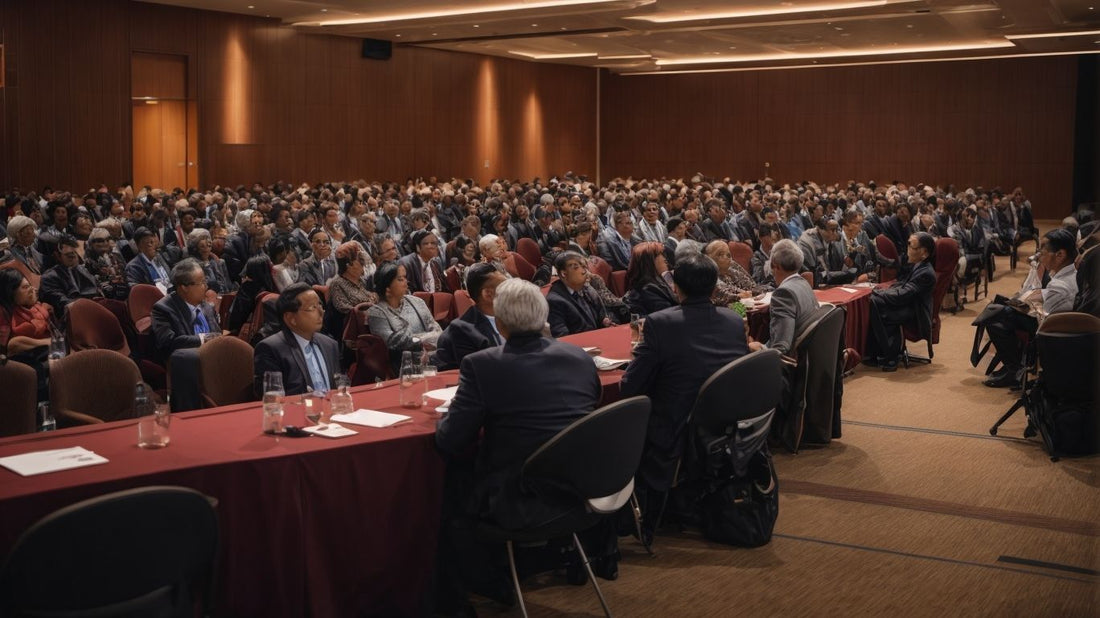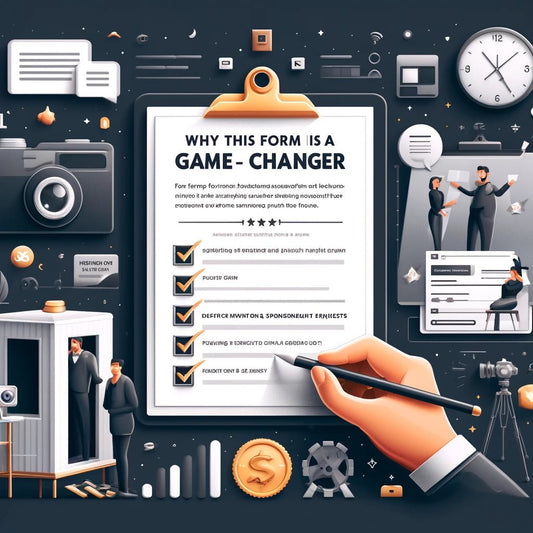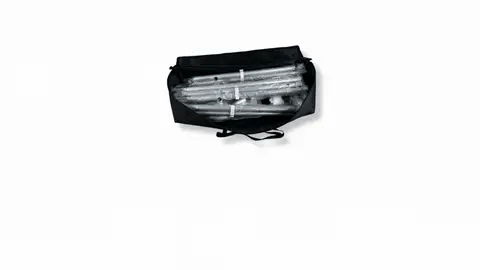
Streamline Corporate Event Logistics for Successful Business Conferences
Share
.jpg)
Corporate events play a crucial role in the business world, serving as platforms for companies to connect with clients, partners, and employees. Successful corporate events require meticulous planning and execution, and that's where corporate event logistics come into play.
Proper planning is essential for corporate events to ensure that every aspect runs smoothly and seamlessly. It involves the strategic coordination of various elements, including venue selection, event design, transportation, audiovisual requirements, food and beverage management, and more.
Understanding the importance of corporate event logistics, event managers and professionals work diligently to handle the key components involved. These components include venue selection and booking, event design and theming, transportation and accommodation arrangements, audiovisual and technical requirements, food and beverage management, entertainment and speaker selection, registration and ticketing processes, and effective marketing and promotion strategies.
However, corporate event logistics also present their fair share of challenges. These challenges can be successfully overcome through careful budget management, comprehensive timeline and schedule management, efficient coordination with vendors and suppliers, meeting attendee expectations, and incorporating technology and digital integration.
To ensure successful corporate event logistics, event planners should establish clear objectives and goals, create a comprehensive checklist, assign roles and responsibilities, communicate effectively with stakeholders, and prepare for contingencies and unexpected situations.
By understanding the importance of corporate event logistics and implementing effective strategies, businesses can create impactful and memorable events that leave a lasting impression on attendees and contribute to the overall success of their organization.
What are Corporate Events?
Corporate events are organized gatherings sponsored by companies to achieve specific objectives. One may wonder, "What are Corporate Events?" Well, they are gatherings that can take various forms, including conferences, trade shows, seminars, galas, product launches, and team-building activities. These events provide a platform for businesses to showcase their brand, establish connections, and engage with their target audience. Additionally, corporate events play a crucial role in enhancing brand image, building relationships, and driving business growth. Planning, coordination, and execution are essential to ensuring a successful outcome and creating a lasting impact on attendees and stakeholders.
Importance of Corporate Event Logistics
Organizing a corporate event requires careful planning and effective execution. The importance of corporate event logistics cannot be overstated. Smooth logistics ensure that the event runs seamlessly, leaving a positive impression on attendees. Key aspects to consider include venue selection, transportation, accommodation, catering, audiovisual equipment, and registration. A well-executed event logistics plan enhances attendee experience, helps achieve event objectives, and reflects positively on the company's image. To ensure successful corporate events, it is essential to pay attention to every detail and work with experienced event management professionals.
Meticulous corporate event logistics is crucial for the success of any event. By prioritizing logistics, companies can create memorable experiences and build strong relationships with clients, partners, and employees. Good planning, coordination, and attention to detail are the hallmarks of effective corporate event logistics. Partnering with experienced event planners and embracing technology can further enhance the logistical aspects of corporate events.
Why is Proper Planning Essential for Corporate Events?
Proper planning is absolutely crucial for corporate events to ensure success and achieve the desired outcomes. Without sufficient preparation, events may face logistical challenges, a subpar attendee experience, and potential failure to meet objectives. Effective planning empowers organizers to establish and clarify goals, develop comprehensive checklists, assign roles, facilitate effective communication, and be prepared for unforeseen circumstances. By dedicating time and effort to planning, organizers can anticipate and address potential issues, manage budgets and timelines, collaborate with vendors, and exceed attendee expectations. Additionally, proper planning enables the seamless integration of technology and digital tools, enriching the overall event experience and maximizing the return on investment. It is important to remember that a well-planned corporate event establishes the foundation for a memorable and meaningful gathering.
Key Components of Corporate Event Logistics
Planning a corporate event? Get ready to dive into the key components that make up successful corporate event logistics. From selecting the perfect venue to managing transportation and accommodation, we'll cover it all. We'll also explore how event design, audiovisual requirements, and food and beverage management play crucial roles in creating a memorable experience. Plus, we'll delve into the importance of entertainment, speaker selection, registration, and marketing to ensure your event is a resounding success. Let's get started with the ins and outs of corporate event logistics!Venue Selection and Booking
Selecting the right venue for venue selection and booking of a corporate event is crucial for its success. Here's a list of factors to consider when it comes to venue selection and booking:
- Capacity: Ensure the venue can comfortably accommodate the number of attendees.
- Location: Choose a location that is easily accessible and convenient for participants.
- Amenities: Look for venues that offer necessary amenities like parking, Wi-Fi, audiovisual equipment, and catering services.
- Ambiance: Consider the atmosphere and design of the venue to align with the event's theme and goals.
- Flexibility: Look for venues that can adapt to different event setups and configurations.
- Budget: Determine the cost of the venue and evaluate if it aligns with the event's budget.
- Availability: Check the venue's availability and book it well in advance to secure your desired date.
Event Design and Theming
Event design and theming are essential aspects when it comes to creating an unforgettable corporate event. Take into account the following key factors:
Conceptualization: Devise a one-of-a-kind theme that aligns with the purpose and target audience of the event.
Decorations: Utilize appropriate color schemes, lighting, and props to establish an immersive atmosphere.
Stage and Set Design: Craft a stage layout that improves speaker visibility and captivates attendees visually.
Audiovisual Elements: Integrate audio and visual elements that complement the theme and enhance the event experience.
Branding: Consistently incorporate the company's branding elements throughout the event to reinforce brand identity.
Interactive Elements: Engage attendees by incorporating interactive activities, such as live demonstrations or photo booths.
Seating and Layout: Strategically arrange seating and tables to ensure comfort and facilitate networking, considering the flow of the event.
Entertainment: Opt for entertainment options like live music or performers that align with the theme and generate excitement.
Detail-Oriented Execution: Enhance the overall event experience by paying attention to small details like signage, table settings, and personalized touches.
Transportation and Accommodation
Selecting transportation and accommodation for a corporate event is of utmost importance in order to ensure a seamless and successful experience for attendees. When contemplating transportation, it is essential to take into consideration factors such as distance, the number of attendees, and the allocated budget. Possible options may include chartering buses, arranging shuttles, or offering reimbursement for individual travel expenses. On the other hand, when it comes to accommodation, it is imperative to consider factors such as proximity to the event venue, cost, and the available amenities. One effective approach is to book a block of rooms at a hotel nearby or negotiate discounted rates to conveniently accommodate the attendees. Prioritizing efficient transportation and comfortable accommodation greatly contribute to a positive experience for the attendees and should be given careful attention.
To ensure a successful transportation and accommodation process, it is crucial to:
- Plan well in advance to secure the best options within the designated budget.
- Clearly communicate transportation and accommodation details to all attendees.
- Regularly monitor and update transportation and accommodation arrangements in order to address any unexpected changes or issues.
- Offer a variety of accommodation options to cater to different preferences and budgets.
- Provide clear instructions and accessible resources for attendees to easily access transportation and accommodation information.
By following these steps, one can ensure that the transportation and accommodation for the corporate event are well-organized, thus enhancing the overall experience for all attendees.
Audiovisual and Technical Requirements
Audiovisual and technical requirements play a pivotal role in organizing corporate events. These requirements are essential to ensure a smooth running event and active engagement from the attendees. Let's take a closer look at the key aspects to consider when it comes to audiovisual and technical requirements.
1. Equipment: It is important to identify the necessary audiovisual equipment, including projectors, screens, sound systems, microphones, and lighting fixtures. These components are crucial for delivering a high-quality experience.
2. Technical Support: Enlisting experienced technicians who can efficiently set up and operate the equipment, troubleshoot any issues, and ensure flawless execution during the event is vital. Their expertise guarantees a seamless experience for both the organizers and attendees.
3. Connectivity: Reliable internet access is necessary for live streaming, virtual presentations, and interactive elements. It is imperative to have a backup plan in place in case of any connectivity issues that may arise.
4. Integration: Coordinating different technologies used for presentations, such as multimedia files, presentations, and live demonstrations, is essential. Testing compatibility and ensuring smooth transitions between these elements is crucial for a successful event.
5. Accessibility: Providing appropriate accessibility features, such as closed captioning, sign language interpretation, and assistive listening devices, is indispensable. These features cater to the needs of attendees with specific requirements and guarantee inclusivity.
To emphasize the significance of audiovisual and technical requirements, let's consider the story of a corporate conference that faced difficulties due to the absence of a competent audiovisual team. As a result, sound issues and disrupted presentations caused delays and hindered attendees' ability to clearly hear and see the content. This unfortunate experience underscores the importance of thorough planning and expert support in creating a memorable and successful event.
Food and Beverage Management
Food and beverage management is a crucial aspect of corporate event logistics. It involves the planning, coordination, and execution of all food and beverage-related aspects of an event to ensure a seamless and satisfying dining experience for attendees. The table below highlights important considerations for effective food and beverage management:
| Aspect | Description |
|---|---|
| Menu Planning | Designing a diverse and appealing menu based on attendee preferences and dietary restrictions. |
| Catering | Partnering with professional caterers to provide high-quality and well-presented dishes. |
| Beverage Selection | Offering a range of alcoholic and non-alcoholic beverages to cater to diverse preferences and ensure responsible consumption. |
| Dietary Accommodations | Providing options for vegan, vegetarian, gluten-free, and other special dietary requirements. |
| Meal Service | Ensuring proper timing, presentation, and quality of meals, with efficient serving and clean-up processes. |
| Bar Service | Managing a well-stocked bar, trained bartenders, and responsible service of alcoholic beverages. |
By effectively managing food and beverage, corporate events can provide a memorable and enjoyable dining experience for attendees, contributing to the overall success of the event.
Entertainment and Speaker Selection
When it comes to corporate event logistics, entertainment and speaker selection are two crucial factors that contribute to creating a memorable and engaging experience for attendees. In order to ensure the success of your event, here are key factors to consider when choosing entertainment and speakers:
- Relevance: It is essential to make sure that the entertainment and speakers align with the event's theme and objectives. This will help to keep the audience engaged and interested.
- Expertise: When selecting speakers, it is important to choose individuals who possess relevant knowledge and experience in the industry or topic being discussed. This will ensure that the content shared is valuable and insightful.
- Engagement: Entertainment plays a significant role in captivating the audience and generating an energetic atmosphere. Look for entertainers who can captivate the audience and create a lively ambiance.
- Diversity: To cater to the diverse interests and backgrounds of the attendees, consider offering a mix of entertainment options and speakers. This will help create an inclusive and dynamic event.
- Feedback: Take into account feedback and reviews from previous events to evaluate the suitability and impact of potential entertainment and speakers. This will assist in making informed decisions.
Did you know that one of the most unforgettable moments in corporate event history was when Steve Jobs introduced the first iPhone during a keynote speech in 2007? His captivating presentation and the groundbreaking product left a lasting impact on the audience and revolutionized the tech industry.
Entertainment and Speaker SelectionRegistration and Ticketing
Registration and ticketing are essential aspects of corporate event logistics, ensuring a seamless and organized experience for both participants and event organizers.
- Streamlined Process: Implementing a user-friendly online registration platform is key to simplifying the registration process and efficiently collecting attendee information.
- Ticketing Options: Providing a variety of ticket types, such as general admission, VIP, or group tickets, allows for different attendee preferences and budgets to be accommodated.
- Customization: Allowing attendees to personalize their registration by offering add-ons or upgrade options, such as networking sessions or exclusive workshops, enhances their overall experience.
- Payment Integration: Integrating secure payment systems enables easy and hassle-free transactions for ticket purchases.
- Check-In and Badge Printing: Utilizing technology solutions facilitates smooth check-in processes and provides printed badges for attendees.
- Data Management: Effectively collecting and managing attendee data provides valuable insights for future event planning and marketing purposes.
- Communication: Keeping attendees informed about event updates, schedule changes, or additional requirements through email updates or a dedicated event app enhances their overall satisfaction.
- On-site Support: Providing dedicated staff or volunteers to assist attendees with registration, ticketing, and any inquiries during the event ensures a high level of attendee support.
Marketing and Promotion
Marketing and promotion are essential elements in the realm of corporate event logistics as they play a pivotal role in driving attendance and generating excitement. To effectively market and promote your event, it is crucial to implement the following strategies:
- Create an engaging event website or landing page that highlights key details and encourages registration.
- Utilize various social media platforms to generate pre-event anticipation, share updates, and interact with potential attendees.
- Collaborate with influential figures or partners in your industry to expand the reach and enhance the credibility of your event.
- Send targeted emails to prospective attendees, emphasizing the benefits and value of participating in your event.
- Implement online advertising campaigns, leveraging platforms like Google AdWords or social media ads, to reach a wider audience.
- Incorporate content marketing tactics, such as blog posts or guest articles, to establish thought leadership and spark interest.
- Offer promotional discounts or incentives for early registration to boost sign-ups and generate a sense of urgency.
- Employ public relations strategies to secure media coverage and create a buzz around your event.
- Execute post-event marketing strategies, such as follow-up emails or social media recaps, to prolong the impact of the event and build momentum for future occasions.
By implementing these marketing and promotion strategies, you can significantly increase event attendance and ensure the success of your corporate event.
Challenges and Solutions in Corporate Event Logistics
Planning a corporate event can be a logistical maze, but fear not! In this section, we'll uncover the challenges and solutions that come with corporate event logistics. From budget management to coordinating with vendors and suppliers, we'll navigate through the intricacies of timeline and schedule management. We'll also explore the vital aspect of managing attendee expectations and the role of technology and digital integration in creating seamless events. So, let's dive in and tackle these corporate event hurdles head-on!Budget Management
- Budget management is an essential and critical element of corporate event logistics. To guarantee a prosperous event within the confines of the budget, it is important to follow the subsequent steps:
- Begin by establishing a practical budget: Assess the available funds and distribute them accordingly to various aspects of the event, including the venue, food, and entertainment.
- Elaborate a comprehensive budget plan: Divide the budget into specific categories and estimate the associated expenses for each category.
- Conduct thorough research and compare prices: Acquire quotations from multiple vendors and suppliers to identify the most advantageous deals and negotiate prices.
- Keep an accurate record of all expenses throughout the planning process to effectively monitor and ensure adherence to the budget.
- Identify potential opportunities for cost-saving: Explore alternatives and innovative solutions to reduce expenses, such as collaborating with sponsors or utilizing internal resources.
- Routinely review the budget and maintain cost control: Make necessary adjustments to prevent overspending and prioritize expenses that align with the objectives of the event.
- Maintain transparent communication with stakeholders: Keep key stakeholders informed about the budget and involve them in decision-making processes to ensure transparency.
Timeline and Schedule Management
Effective timeline and schedule management is vital for the successful logistics of corporate events. It guarantees that all tasks are accomplished promptly and helps prevent any delays or conflicts in the event planning process.
Here is a table that provides an overview of timeline and schedule management for corporate events:
| Task | Start Date | End Date |
|---|---|---|
| Define event objectives and goals | DD/MM/YYYY | DD/MM/YYYY |
| Create event timeline | DD/MM/YYYY | DD/MM/YYYY |
| Identify key milestones | DD/MM/YYYY | DD/MM/YYYY |
| Allocate tasks and set deadlines | DD/MM/YYYY | DD/MM/YYYY |
| Regularly review and update schedule | DD/MM/YYYY | DD/MM/YYYY |
| Monitor progress and adjust timeline | DD/MM/YYYY | DD/MM/YYYY |
| Finalize event schedule | DD/MM/YYYY | DD/MM/YYYY |
By following a well-planned schedule, organizers can ensure that all necessary tasks are completed on time, avoiding any last-minute rush or potential conflicts. This leads to a smooth and successful corporate event.
Coordination with Vendors and Suppliers
Coordination with vendors and suppliers is a critical aspect of ensuring smooth corporate event logistics. In order to achieve success in this process, there are several key considerations to keep in mind:
- Research and Selection: It is important to conduct thorough research to identify potential vendors and suppliers that align with your event requirements and budget.
- Negotiation and Contracts: Take the time to negotiate pricing, terms, and conditions with vendors and suppliers to establish a mutually beneficial agreement. It is essential to clearly communicate expectations and document everything in contracts.
- Communication and Coordination: It is crucial to maintain open lines of communication throughout the planning and execution stages with vendors and suppliers. Regular updates should be provided regarding event details, changes, and requirements.
- Timelines and Deadlines: Setting clear timelines and deadlines for deliverables and payments is necessary. Regular follow-ups are important to ensure that vendors and suppliers meet these deadlines.
- Quality Control: Monitoring and evaluating the performance and quality of services provided by vendors and suppliers is essential. Any issues should be addressed promptly, and solutions should be sought.
In 1954, the International Organization for Standardization (ISO) was founded, playing a significant role in enhancing coordination between vendors and suppliers globally. The ISO standards provide a framework for effective collaboration, ensuring the delivery of quality products and services for corporate events.
Managing Attendee Expectations
Managing attendee expectations is a crucial aspect of corporate event logistics. By effectively managing attendee expectations, organizers can ensure that attendees have a positive experience. Key factors in managing attendee expectations include accurately communicating event details beforehand and addressing any concerns or questions. It is also important to set realistic expectations regarding the event's objectives and outcomes. Organizers can incorporate feedback from previous events to improve future events and meet attendee expectations. By proactively managing expectations, organizers can enhance attendee satisfaction and create a successful event.
Technology and Digital Integration
- Technology and digital integration play a pivotal role in ensuring the success of corporate event logistics. By embracing the latest technological advancements, organizers can elevate the attendee experience, streamline processes, and enhance communication.
- One effective approach to incorporating technology in corporate events is by utilizing event management software. This powerful tool can effectively handle various tasks including registration, ticketing, and management of attendee data.
- Event apps are also crucial in enabling seamless integration. With event apps, attendees can enjoy personalized schedules, interactive maps, and real-time updates, making their experience more engaging and efficient.
- To further enhance corporate events, live streaming and virtual reality can be integrated to allow remote participation. This enables individuals who are unable to physically attend to still engage and participate in the event.
- An effective way to incorporate technology is through the use of digital signage and interactive displays. These tools are not only great for branding purposes but also for disseminating important event information in an interactive and visually appealing manner.
- Social media platforms are essential for event promotion and engagement. By utilizing these platforms, organizers can effectively reach a wider audience and create a sense of anticipation and excitement.
Fact: According to a survey, technology adoption has significantly improved event outcomes for 70% of event organizers.
Tips for Successful Corporate Event Logistics
Planning a successful corporate event requires attention to detail and efficient logistics. In this section, we will uncover some valuable tips to ensure your corporate event runs smoothly from start to finish. From establishing clear objectives and goals to creating a comprehensive checklist, assigning roles and responsibilities, effective communication with stakeholders, and preparing for contingencies, we'll explore the key aspects that contribute to a seamless and memorable corporate event experience. Get ready to discover essential strategies for mastering corporate event logistics!Establish Clear Objectives and Goals
When organizing corporate events, it is paramount to establish clear objectives and goals. This will set the course for the event and guarantee that all planning and execution efforts are aligned towards achieving those objectives and goals. Clearly defined objectives provide a focal point for the event and aid in identifying the target audience, budget, and desired outcomes. Goals can encompass a variety of aims such as promoting a new product or service, enhancing brand awareness, or facilitating networking and collaboration among attendees. By defining objectives and goals early on, event planners can make well-informed decisions regarding venue selection, marketing strategies, and the event program. Moreover, this approach assists in evaluating the event's success based on the extent to which these objectives and goals were met.
To ensure the establishment of well-defined objectives and goals for a corporate event, it is essential to:
- Conduct a comprehensive needs assessment in order to grasp the event's purpose and desired outcomes.
- Collaborate with stakeholders and key decision-makers to delineate clear and measurable goals.
- Establish specific targets that can be monitored and assessed after the event.
- Communicate the objectives and goals to all parties involved, including vendors, sponsors, and attendees, in order to align expectations and maximize engagement.
Establishing clear objectives and goals is critical for the successful execution of corporate event logistics. It provides a roadmap for planning, execution, and evaluation, guaranteeing that the event achieves the desired outcomes and fulfills the needs of stakeholders.
Create a Comprehensive Checklist
- Create a comprehensive checklist for successful corporate event logistics.
- Include the following key aspects in your checklist:
- Event objectives and goals
- Budget allocation and tracking
- Venue selection and booking
- Event design and theming
- Transportation and accommodation arrangements
- Audiovisual and technical requirements
- Food and beverage management
- Entertainment and speaker selection
- Registration and ticketing
- Marketing and promotion strategies
- Including these elements in your checklist will ensure a well-organized and successful corporate event.
Fact: According to a survey conducted by EventMB, 95% of event planners believe that creating a comprehensive checklist is crucial for the success of their events.
Assign Roles and Responsibilities
Assigning roles and responsibilities is crucial for successful corporate event logistics. Clear delegations ensure that tasks are completed efficiently, leading to a well-executed event. Here are a few steps to consider in assigning roles and responsibilities:
- Identify the tasks required for the event.
- Assess the strengths and skills of your team members.
- Assign specific tasks to team members based on their expertise.
- Clearly communicate expectations and deadlines.
- Provide necessary support and resources to team members.
- Regularly check in with the team to ensure progress.
- Encourage collaboration and teamwork.
Pro-tip: Encourage open communication and empower team members to take ownership of their assigned tasks. This fosters a sense of accountability and ensures a smooth flow of responsibilities.
Communicate Effectively with Stakeholders
When organizing corporate events, effective communication with stakeholders is crucial for success. Here are some tips to ensure effective communication:
- Establish clear objectives and goals: Clearly communicate the purpose of the event to stakeholders.
- Create a comprehensive checklist: Share a detailed checklist with stakeholders to ensure everyone is aware of their responsibilities.
- Assign roles and responsibilities: Clearly assign tasks to stakeholders and provide regular updates on progress.
- Communicate effectively with stakeholders: Use various communication channels to keep stakeholders informed about event details.
- Prepare for contingencies: Keep stakeholders informed about any unexpected situations and provide alternative solutions.
Prepare for Contingencies and Unexpected Situations
Preparing for contingencies and unexpected situations is crucial in corporate event logistics to ensure a smooth and successful event. Here are some steps to take:
<ul>
By proactively preparing for contingencies and unexpected situations, corporate event organizers can minimize the impact of unforeseen events and ensure the overall success of the event.






